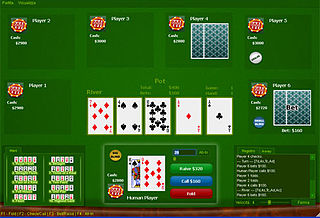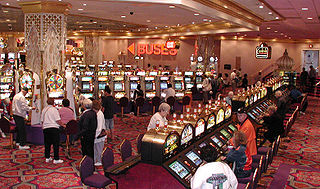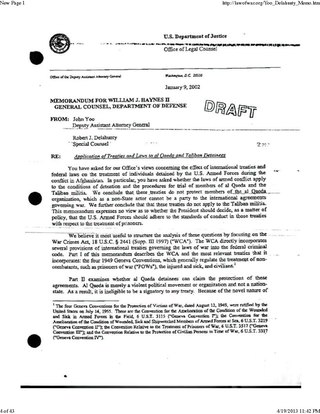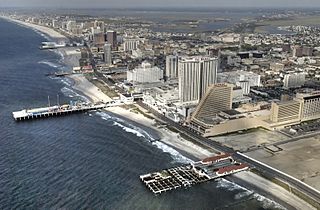A fantasy sport is a game, often played using the Internet, where participants assemble imaginary or virtual teams composed of proxies of real players of a professional sport. These teams compete based on the statistical performance of those players in actual games. This performance is converted into points that are compiled and totaled according to a roster selected by each fantasy team's manager. These point systems can be simple enough to be manually calculated by a "league commissioner" who coordinates and manages the overall league, or points can be compiled and calculated using computers tracking actual results of the professional sport. In fantasy sports, as in real sports team owners draft, trade, and cut (drop) players.

The United States Department of Justice (DOJ), also known as the Justice Department, is a federal executive department of the United States government tasked with the enforcement of federal law and administration of justice in the United States. It is equivalent to the justice or interior ministries of other countries. The department is headed by the U.S. attorney general, who reports directly to the president of the United States and is a member of the president's Cabinet. The current attorney general is Merrick Garland, who has served since March 2021.

Online poker is the game of poker played over the Internet. It has been partly responsible for a huge increase in the number of poker players worldwide. Christiansen Capital Advisors stated online poker revenues grew from $82.7 million in 2001 to $2.4 billion in 2005, while a survey carried out by DrKW and Global Betting and Gaming Consultants asserted online poker revenues in 2004 were at $1.4 billion. In a testimony before the United States Senate regarding Internet Gaming, Grant Eve, a Certified Public Accountant representing the US Accounting Firm Joseph Eve, Certified Public Accountants, estimated that one in every four dollars gambled is gambled online.
Online casinos, also known as virtual casinos or Internet casinos, are online versions of traditional casinos. Online casinos enable gamblers to play and wager on casino games through the Internet. It is a prolific form of online gambling.

Sports betting is the activity of predicting sports results and placing a wager on the outcome.

In the United States, a sportsbook or a race and sports book is a place where a gambler can wager on various sports competitions, including golf, football, basketball, baseball, ice hockey, soccer, horse racing, greyhound racing, boxing, and mixed martial arts. The method of betting varies with the sport and the type of game. In the US, the Professional and Amateur Sports Protection Act of 1992 allowed only Nevada, Oregon, Montana, and Delaware to legally wager on sports other than horse racing, greyhound racing, and jai alai; the law was ruled unconstitutional on May 14, 2018, freeing states to legalize sports betting at their discretion.
Online gambling is any kind of gambling conducted on the internet. This includes virtual poker, casinos, and sports betting. The first online gambling venue opened to the general public was ticketing for the Liechtenstein International Lottery in October 1994. Today, the market is worth around $40 billion globally each year, according to various estimates.

The Office of Legal Counsel (OLC) is an office in the United States Department of Justice that assists the Attorney General's position as legal adviser to the President and all executive branch agencies. It drafts legal opinions of the Attorney General and provides its own written opinions and other advice in response to requests from the Counsel to the President, the various agencies of the Executive Branch, and other components of the Department of Justice. The Office reviews and comments on the constitutionality of pending legislation. The office reviews any executive orders and substantive proclamations for legality if the President proposes them. All proposed orders of the Attorney General and regulations that require the Attorney General's approval are reviewed. It also performs a variety of special assignments referred by the Attorney General or the Deputy Attorney General.

In the United States, gambling is subject to a variety of legal restrictions. In 2008, gambling activities generated gross revenues of $92.27 billion in the United States.
Mobile gambling refers to playing games of chance or skill for money by using a remote device such as a tablet computer, smartphone or a mobile phone with a wireless internet connection. Over a hundred mobile casinos were operating as of December 2013, with most of the big casino operators in gambling now providing a mobile platform for their player base.

The Unlawful Internet Gambling Enforcement Act of 2006 (UIGEA) is United States legislation regulating online gambling. It was added as Title VIII to the SAFE Port Act which otherwise regulated port security. The UIGEA prohibits gambling businesses from "knowingly accepting payments in connection with the participation of another person in a bet or wager that involves the use of the Internet and that is unlawful under any federal or state law." The act specifically excludes fantasy sports that meet certain requirements, skill games, and legal intrastate and intertribal gaming. The law does not expressly mention state lotteries, nor does it clarify whether interstate wagering on horse racing is legal.

The Professional and Amateur Sports Protection Act of 1992, also known as PASPA or the Bradley Act, was a law, judicially-overturned in 2018, that was meant to define the legal status of sports betting throughout the United States. This act effectively outlawed sports betting nationwide, excluding a few states.
The Southern District of New York (SDNY) Action Against Online Poker Players was a legal action taken by the Department of Justice in an effort to crack down on online poker. The action occurred around June 8, 2009, when the government ordered four banks to freeze over 34 million dollars in payments owed to about 27,000 poker players. According to the Poker Players Alliance, a grass-roots organization for poker players, federal prosecutors ordered Citibank, Wells Fargo and Goldwater Bank and Alliance Bank of Arizona to freeze the accounts of Allied Systems and Account Services. Allied Systems and Account Services are two of the account-management companies that Full Tilt Poker, Absolute Poker, Ultimate Bet and PokerStars use for the disbursement of funds.

Gambling on papal elections has at least a 500-year history. Betting on 16th-century papal conclaves are among the first documented examples of gambling on election outcomes. During the same period, gambling was also common on the outcomes of secular Italian elections, such as that of the Doge of Venice.

A set of legal memoranda known as the "Torture Memos" were drafted by John Yoo as Deputy Assistant Attorney General of the United States and signed in August 2002 by Assistant Attorney General Jay S. Bybee, head of the Office of Legal Counsel of the United States Department of Justice. They advised the Central Intelligence Agency, the United States Department of Defense, and the President on the use of enhanced interrogation techniques—mental and physical torment and coercion such as prolonged sleep deprivation, binding in stress positions, and waterboarding—and stated that such acts, widely regarded as torture, might be legally permissible under an expansive interpretation of presidential authority during the "War on Terror".

Gambling in New Jersey includes casino gambling in Atlantic City, the New Jersey Lottery, horse racing, off-track betting, charity gambling, amusement games, and social gambling. New Jersey's gambling laws are among the least restrictive in the United States. In 2013, the state began to allow in-state online gambling. Five years later, the state won a lawsuit that dismantled Nevada's monopoly on legal sports betting.
Legal forms of gambling in the U.S. state of Massachusetts include casinos, sports betting, parimutuel wagering on horse racing, the Massachusetts Lottery, and charitable gaming. The Massachusetts Gaming Commission regulates commercial operations under state jurisdiction.

Steven Andrew Engel is an American lawyer. He served as the United States assistant attorney general for the Office of Legal Counsel in the Trump administration. Engel, who previously worked in the George W. Bush administration as deputy assistant attorney general in the Office of Legal Counsel, was nominated by President Donald Trump on January 31, 2017, and confirmed on November 7, 2017.
Murphy v. National Collegiate Athletic Association, No. 16-476, 584 U.S. 453 (2018) [138 S. Ct. 1461], was a United States Supreme Court case involving the Tenth Amendment to the United States Constitution. The issue was whether the U.S. federal government has the right to control state lawmaking. The State of New Jersey, represented here by Governor Philip D. Murphy, sought to have the Professional and Amateur Sports Protection Act (PASPA) overturned, allowing state-sponsored sports betting. The case, formerly titled Christie v. National Collegiate Athletic Association until Governor Chris Christie left office, was combined with NJ Thoroughbred Horsemen v. NCAA No. 16-477.
The Illinois Sports Wagering Act was passed into law on June 28, 2019 with the first legal wager being placed on March 9, 2020 The Act allows for individuals 21 or older to place monetary wagers on live sporting events. In 2018, the United States Supreme Court held in Murphy v. National Collegiate Athletic Ass'n that states may authorize and license sports gambling, finding that certain provisions of the federal Professional and Amateur Sports Protection Act were unconstitutional. This ruling opened the door for states like Illinois to allow legal sports betting to their citizens. Illinois allows wagers to be placed on many sports including football, basketball, baseball, hockey, boxing, MMA, and other, less mainstream events.










